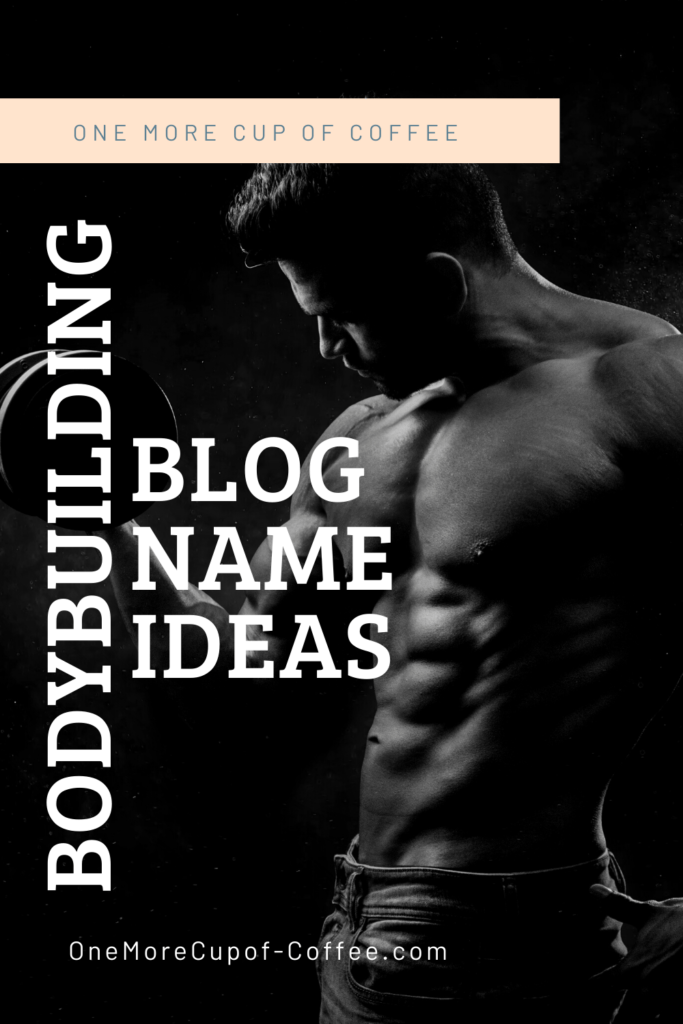
Bodybuilding great topic for your own blog. Thanks to bro science, you don’t need to be an expert on bodybuilding either. Just be willing to learn and be opinionated. To get started, you’re going to need some interesting bodybuilding blog name ideas.

Are You Ready To Work Your Ass Off to Earn Your Lifestyle?
Are you tired of the daily grind? With a laptop and an internet connection I built a small website to generate income, and my life completely changed. Let me show you exactly how I’ve been doing it for more than 13 years.
Blog names are fascinating. Despite all the blogs that are already online, there’s no shortage of potential blog names for you to choose from. This is the part that can get overwhelming.
It’s easy to feel lost in all the choices. Where do you start? How do you find the best name for you?
In this post, we’re showcasing a variety of bodybuilding blog names that you can use as inspiration. We also talk about ways to come up with your own blog name and some general guidelines to consider.
Even more importantly, we talk about other aspects of creating a successful site, like buying the domain name, building your site, and potentially making money from it too (it’s easier than you think).
By the end of the post, you should know exactly how to find a good name for your site and be well on the way to getting your site built and cash flowing!
50 Bodybuilding Blog Name Ideas
- Muscle Man Solutions
- My Muscle Man
- Building My Bulk
- Plain Bodybuilding
- Greenhorn Muscles
- Special Bodybuilding
- Novice Muscle Builders
- Female Conquer
- Muscle Building for Pros
- Body Advantage Pro
- Gym Girls Zone
- Muscle Nutrition Coach
- Vigor and Muscle
- Greenhorn Bodybuilding
- Muscle Life Solutions
- Bodybuilding Schedules
- Muscle Mechanics Zone
- Bulking Systems
- Athletic Female Bodybuilding
- Fitness and Might
- Female Strength Institute
- Bodybuilding Services
- Flexing Healthy
- Muscle Nutrition World
- Bodybuilding Nutrition Guide
- Muscles for the Hustle
- Bodybuilding Innovation
- Best Bodybuilding Dietary Supplements
- Chick Magnet Zone
- Lifting Nutrition
- Beginner Bodybuilding Diet
- Firm Female
- Native Bodybuilding
- Trainee Bodybuilder
- Bulk It Up Guide
- Female Strength and Mscule
- Empowered Bodybuilding
- Bulking Up Now
- Athletic Bodybuilding Diet
- Empowered Bulking
- Best Bodybuilding Products
- Fitness and Muscle Solution
- Bodybuilding for Teens
- Strong Female Guide
- Feminine Fitness and Muscle
- Bulking Systems
- Muscle Man Academy
- Athletic Body Builds
- Fitness and Force
- Conquer Bodybuilding

How To Choose A Good Blog Name
Even the worst blog name in the world isn’t likely to ruin your chances of success. Still, some names are going to be better than others, so with this section, we’re going to highlight a few general rules that can help you choose a blog name that will work well.
The first rule is simple – don’t steal. Your blog name should be unique. Being too similar to another site isn’t going to do you any good at all. You’ll simply find that visitors get confused and it becomes more difficult to build your reputation. I’d recommend NOT going with bodybuilding-2.com
You might even confuse search engines as well. Besides, there aren’t any benefits in picking a similar-sounding name. This means doing some research. Have a look at search engine and social media results for any names that you’re interested in.
Another thing is to think about the words you’re going to use carefully. Choosing a clever name, but not if doing so confuses your audience. Something like GrandmasHouse.com would be funny, but would people get the joke?
Numbers and misspelling words are two of the biggest issues to watch out for. The problem is that people don’t know how to spell out your domain name if they just hear it in passing. This can make your blog harder to find again too, as visitors will remember the name, not the spelling.
One example is the site skinny2fit.com. This could easily be written as skinnytofit.com as well.
Be aware of dashes too. These have their uses, but they make blog names harder to remember. Take the site the-bodybuilding-blog.com as an example. While the dash placement is logical, it would be easy to forget to include the dashes.
Some people might also write the name out as the-body-building-blog.com. That’s a problem. I generally suggest avoiding dashes altogether. If you are going to use them, stick to a two word title like gym-talk.com, as the potential for mistakes is minimal.
When you’re looking for a name, think about what makes you or your site unique. For example, the site femalemuscle.com specifically targets female bodybuilders, while projectswole.com focuses on making your body look great.
Taking a look at the other blogs out there can be a fun way to get ideas, while also seeing who you’re competing against.
Needless to say, I didn’t follow many of these ‘rules’ with my own site name – onemorecupof-coffee.com. My choice of name made things a little more difficult initially, but it simply hasn’t mattered in the long-term.

Keyword VS Branding
Blog names can generally be broken down into two distinct styles. The first is a keyword approach, where your blog name contains (you guessed it!) a keyword. Bloggers often rely on keywords to get search engine traffic, so including one in your domain name just makes sense.
Some such names follow an exact match style. This means that your blog name contains a full keyword phrase.
Other blog names simply use one or two individual words that are related to the field.
The site muscleandfitness.com is one example. It’s easy to see that the site is devoted to fitness and that it’s likely to include some information on bodybuilding. However “muscle and fitness” isn’t a phrase that anyone is likely to be searching directly. And example of an “exact match” domain might be loseweightbuildmuscle.com. Less exciting, but pretty obvious what it’s about.
Of course, you don’t need to use keywords at all. Some bloggers focus on branded names instead. With these, the goal is to be memorable and create a compelling name.
Branded names follow all sorts of styles. The topic will sometimes be obvious like it is with the site getbig.com, which strongly focuses on bodybuilding. Other times, the topic is more obscure, like with the site scoobysworkshop.com.
There’s no right or wrong with these blog name styles. But, blog names that contain at least one keyword can be easier to find in the beginning, when you don’t have any brand awareness. With these, you have a keyword to act as a starting point.
In fact, one simple technique is to start with a short keyword phrase like ‘bodybuilding techniques’ and then add something unique to make it distinctive to you. The site johndoebodybuilding.com does precisely this.
Doing so means that the topic of your blog remains obvious, but you’re not relying on one highly specific keyword phrase.
How To Buy A Domain Name
If you now have a blog name in mind, the next step is buying the domain. This isn’t a difficult process at all.
You just need a domain name registrar. GoDaddy is the most obvious choice, although I don’t recommend them. GoDaddy relies on too many upsells for my taste, along with misleading pricing. You often end up paying more than you need to.
Sometimes beginners also find that they end up paying for services that aren’t even relevant to them. It’s always best to go with companies that are transparent. This way you know what you’re getting and how much you’ll be paying right from the beginning.
Namecheap is my service of choice for this reason. I also like how Namecheap has an easy-to-use interface and good support.

How To Build & Make Money From Your Bodybuilding Website
Creating your website might seem confusing, as there are so many services out there. Thankfully, these can be broken down into two broad categories – website builders and a self-hosted blog.
Let’s begin with website builders.
One example is the builder from GoDaddy. This drag-and-drop builder is very popular, partly because GoDaddy markets it so heavily. There are many others too, like Weebly, Wix and Squarespace.
Website builders can work very differently from each other. They often have their own distinct set of features – and limitations. Some offer free plans, while others make you pay right from the beginning.
Still, there are some general themes across the different builders.
- First. Website builders tend to be easy-to-use. It doesn’t take long to create your site and the finished product will often look very good. You don’t need any technical background either.
- Second. Customization options are limited. What you can do varies from service-to-service, but you might only have very basic SEO capabilities or limitations in connecting your social media accounts.
- Third. There are often multiple plans to choose from. These can get expensive fast. It’s not always clear what you’re getting for your money either.
The limitations of website builders aren’t too bad if you’re just you’re making a small site for a local business or something similar. But, they suck if you want to make money with your blog.
To put it simply – you don’t have enough flexibility. You would find that your site gets more and more frustrating as time goes along. You can’t simply switch to another host or service either. You’re stuck where you are.
The other style is a self-hosted WordPress site. This approach involves using the WordPress content management system. WordPress is getting much easier to use these days and there are plenty of great tutorials to get you started.
WordPress is the most popular website builder out there, and it’s totally free to use. Since it’s so popular, it means you have multiple choices of where to host your content, and it also makes it easy to switch hosts to a competitor if you are not satisfied with your website speed or level of service.
You also have access to many powerful plugins and themes to modify your site, both free and paid. Plus, there are vast numbers of cheap coders from around the world who will work on your website for as little as $5 to $15 per hour if you need custom coding.
How Much Do Bodybuilding Bloggers Make?
While there are many possible income streams, most bloggers get started with affiliate marketing or display ads. Those two techniques are useful because they can be scaled up over time. You don’t need a popular site to get started either.
One of the best examples of success doesn’t come from a bodybuilding site at all, but from one that focuses on fitness. The site is Nerd Fitness, which you’ve probably heard of.
Interviews suggest that the site now has a revenue of around seven figures, along with staff members and various courses. Even more impressively, Nerd Fitness started as just a small fitness blog. Hey – that’s what you’re starting right now!
A second example is the site Ironwild Fitness. This is a much smaller site, with the July 2019 income report highlighting an income of around $83. Not much, right? We all gotta start somewhere though. My first sale in the computer software industry was a meager $5, and within two years I was raking in six figures. Success tends to snowball.
While I couldn’t find many bodybuilding blogs showcasing their earnings, the potential to earn money is absolutely there, both with targeted promotions of affilaite products, and general ad income views and clicks.
Display Ads
Display ads are the first income style that we’re going to consider. The idea is precisely what the name suggests – you’re displaying ads on your website.
To do so, you work with display ad networks, like Google AdSense or MediaVine. Once you have everything set up, there isn’t much more work that you need to do. Working directly with Adsense means you can choose where to display ads on your site, then Adsense will decide which ads to display based on each visitors search history (Big Brother is REAL).
MediaVine on the other hand just has you install a WordPress plugin, and they they’ll choose all the ad placements for you, and even run tests to optimize your ads for performance and earnings.
Display ads don’t require all that much effort. You don’t even need to publish promotional content. Just do your thing, create content, and get paid. They mostly take care of themselves, giving you the chance to write about whatever you want to. This is much easier than having to think about sales pitches and products while you are creating content.
Display ads are especially good for sites that don’t have a strong product focus.
For example, if your bodybuilding blog heavily focuses on food and recipes – display ads would be a natural choice. Many food bloggers do precisely this. The same might be true if your blog is going to rely on personal stories.
The biggest limitation is that you earn hardly anything per visitor with display ads. You need to bring in a lot of traffic to start making a decent income. Doing so is possible if you put in enough time and effort. Nevertheless, don’t expect to be earning large amounts of money right from the beginning.

Affiliate Links
Affiliate links are the other main angle to talk about. This process is more involved, as you need to sign up for programs and find products yourself. You also need to actively promote items on your site. That includes talking about products in your content.
People shy away from the idea for various reasons. Some feel like affiliate links sound like too much effort, while others are worried about being too ‘salesy’ or manipulating their audience.
But honestly, you get to do affiliate marketing however you want to. You certainly don’t need to manipulate anyway. Many affiliate marketers rely on honest product reviews and only promote products that they actually like. If you don’t like a product, don’t promote it. Just type in an affiliate disclosure at the top of the page (or next to each affiliate link), and everything will be on the up-and-up.
A good affiliate site will provide as many benefits to the visitor as it does to the owner. In fact, that’s the whole point. You are doing the heavy lifting of research and information consolidation. Who wants to read 500 reviews of protein powders? Nobody. So you read the reviews, test it out for yourself, write your own opinion, and help a reader make a good decision at the end of the article.
Regardless of whether you make money through ads, affiliate links or something else, your site should provide your visitor with information and value.
Affiliate links work well because you’re not just earning a tiny amount from each visitor. Your per visitor income will increase dramatically.
There are even bodybuilding affiliate programs that you can try out, along with programs for fitness equipment and sports supplements.
Final Thoughts
It’s easy to get focused on one part of your site, like your blog name. But, it really is your site as a whole that determines whether you are successful or not. You can create a highly profitable site with a ‘bad’ name or a mediocre site with a ‘good’ name.
In the end, you always need to bring your focus back to your site as a whole. Make sure that you’re producing good content and providing your visitors with value.
Should You Start Your Own Blog?
Honestly, the sad thing is that most people who want to start a blog get a domain name and a website set up, but never really do much beyond that. They are leaving a serious amount of money on the table!
If you want to actually make something of your site, and earn the kind of income that could allow you to quit your job and work full time online, then this members-only training site is what I recommend. If you're serious about making some moves, they're your best shot at building some fat traffic to your brand and profiting from your blog!

Nathaniell
What's up ladies and dudes! Great to finally meet you, and I hope you enjoyed this post. My name is Nathaniell and I'm the owner of One More Cup of Coffee. I started my first online business in 2010 promoting computer software and now I help newbies start their own businesses. Sign up for my #1 recommended training course and learn how to start your business for FREE!

 10 Mobile App Surveys That Pay Cash (And 16 That Don’t)
10 Mobile App Surveys That Pay Cash (And 16 That Don’t)
Leave a Reply